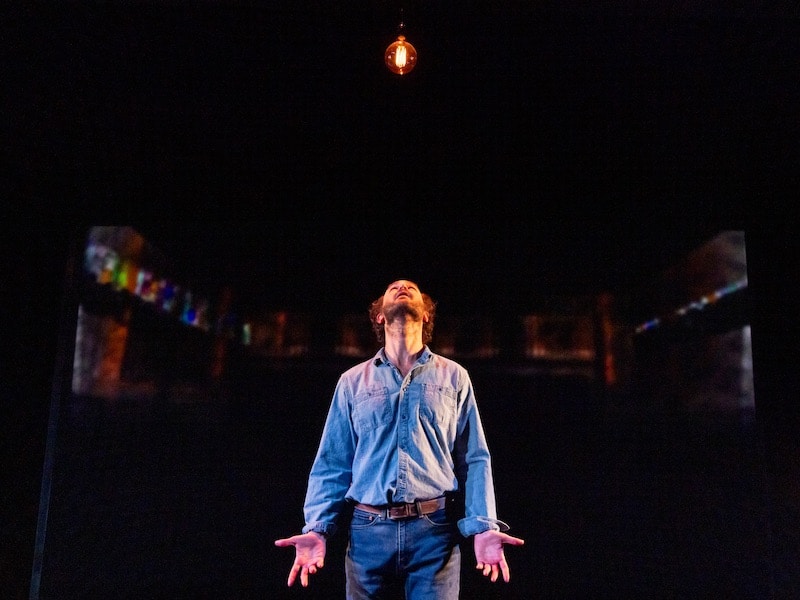The biblical Moses, as it is written, encountered God in a flaming bush that was not consumed. No such miracle awaits the Moses in the eponymous solo play now premiering at Theater J who is faced with a fire that did consume: it burned to the ground his home and reduced to ashes his wife and their five children who were inside. Moses was not there to protect them. He was elsewhere. He had turned off his phone. And the crushing guilt he now feels from that dereliction of familial duty propels him through what becomes a wending and deeply moving drama of one man’s encounter with conscience … and maybe God.
The absorbing play that starts with this man’s unfathomable loss was written by Michele Lowe, a former ad exec who used to write jingles. A New York Times profile called her “the Rabbi Whisperer” because she has a sideline coaching rabbis about how to write better sermons. Her good advice: “It has to be compelling; there has to be some drama in it.” And as this play’s 90 minutes fly by, one might well get the sense that Lowe’s text — richly rendered in Grant Harrison’s eloquent performance and Johanna Gruenhut’s stirring direction — is a brilliantly crafted narrative homily, a story that in its simple telling evokes a dimension of human character and a lesson about redemption rarely seen on the stage.

Suspended in the slate gray playing space, tungsten bulbs glow golden; on a rear projection screen, hot orange flames undulate; on the sound system, a catastrophic conflagration crackles (scenic design by Nephelie Andonyadis; lighting, Jesse W. Belsky; projections, Kelly Colburn; sound, Tosin Olufolab). The casually dressed Man who enters is in a nightmare of nowhere. His name is Moses Schneider, but, he tells us, he is a nonentity: “A nothing. A nobody. You passed him on the #1 train and if you bumped into him, he didn’t say anything because he was too much of a nothing.”
Then Harrison the actor shifts his point of view and vocal inflection, suddenly wondering and marveling aloud as someone else: “How Moses married such a woman and had those kids…?”
Throughout we will watch as Harrison slips easily in and out of roles and dialects — police officers who quiz him about where he was when the fire started, his close friend Solomon whose wife Rachel is suspicious of him, his grandmother Gussie who knew he absconded when his braindead mother lay dying, assorted folks he meets on his travels to escape from his pain including a tattoo parlor inker.
Harrison’s transformations are slight and subtle, never broad caricatures; Lowe’s deftly scripted lines contain most of what we need to know about who is who. And as often as Harrison inhabits other voices and personas, he comments as his own character in the third person, as when he says:
Moses did not feel like other human beings. Without the memory of his wife and children, he skated on the surface of life. Some might say that God had hardened Moses’s heart. That the desire for disconnection could not be achieved otherwise. In order to fulfill Moses’s request, what choice did God have?
Along the way, we get to know not only Moses’ acute compunction (“his brittle little heart”) but also his gentle and affable sense of humor (which the opening night audience quite enjoyed) and his lifelong dream of becoming a rabbi — a notion his father derisively laughed at when he was a boy. But Moses never stops longing for the proximity to God that he believes is bestowed on the rabbinate.

There are moments in Moses so poignant that they return in memory like sorrow: the point when Moses discovers in the debris of his house the bar mitzvah yarmulke of his eldest son, the scene in the cemetery when Moses digs barehanded into deep snow to touch the gravestones of his lost loved ones… Moses’ guilt and grief are the leitmotif of his life, and we are there to bear witness.
Can a one-person play tell the honest story of a soul’s progress without going all abstract and woo-woo? — that is the dramaturgical question that Moses puts soundly to rest. Lowe’s precisely and poetically calibrated text and Harrison’s enthralling modulation of Moses’ emotional life combine to delineate someone who is very ordinary but who, as we get to know them more and more, unexpectedly helps us know something of our own irregular wrangling with unrighteousness.
The Moses onstage now at Theater J is ablaze with beneficence. Catch it while it burns.
Running Time: 90 minutes with no intermission.
Moses plays through December 24, 2023, at Theater J at the Aaron & Cecile Goldman Theater in the Edlavitch DC Jewish Community Center, 1529 16th Street NW, Washington, DC. Purchase tickets ($50–$70, with member and military discounts available) online, by calling the ticket office at 202-777-3210, or by email ([email protected]).
Moses is the second in Theater J’s Here I Am series of three one-person plays focusing on identity and the relationship between the individual and the family. The first was Iris Bahr’s See You Tomorrow. The next is Sun Mee Chomet’s East Coast premiere of How to Be a Korean Woman in January.
The Here I Am series program is online here.
COVID Safety: Masks are required for Thursday evening and Saturday matinee performances. For more information, visit Theater J’s COVID Safety Guidelines.
Moses
Written by Michelle Lowe
Directed by Johanna Gruenhut
Performed by Grant Harrison
Scenic Design: Nephelie Andonyadis
Costume Design: Johnna Presby
Lighting Design: Jesse W. Belsky
Projection Design: Kelly Colburn
Sound Design: Tosin Olufolab
Props Consultant: Pamela Weiner
Casting Director: Elizabeth Hay
Production Stage Manager: Anthony O. Bullock
Assistant Stage Manager: Fior Tat





Beautifully written. So glad I read this, since the promotional material (from Theater J) did not suggest its power or depth.